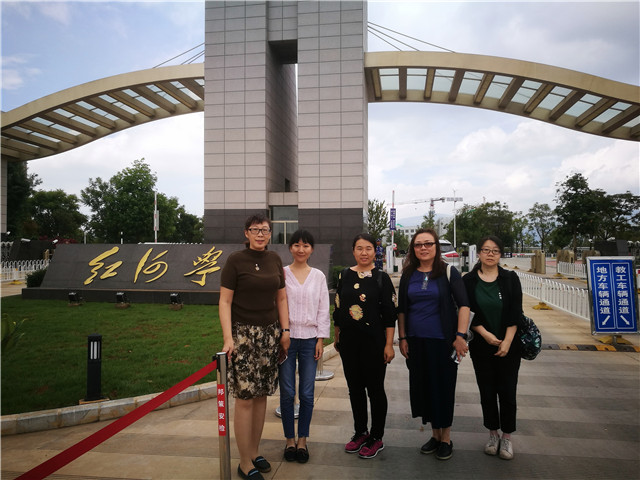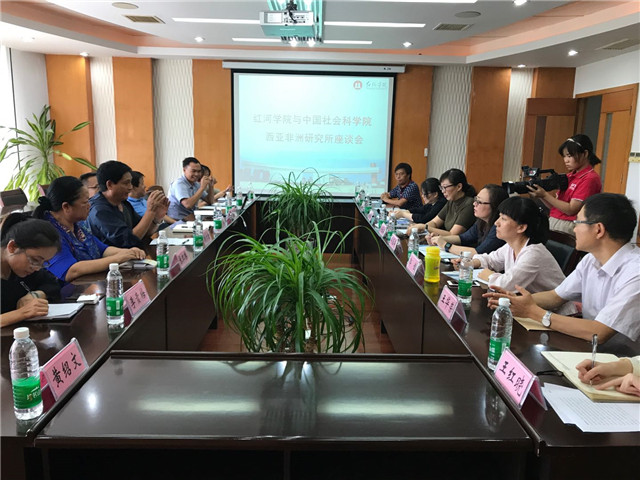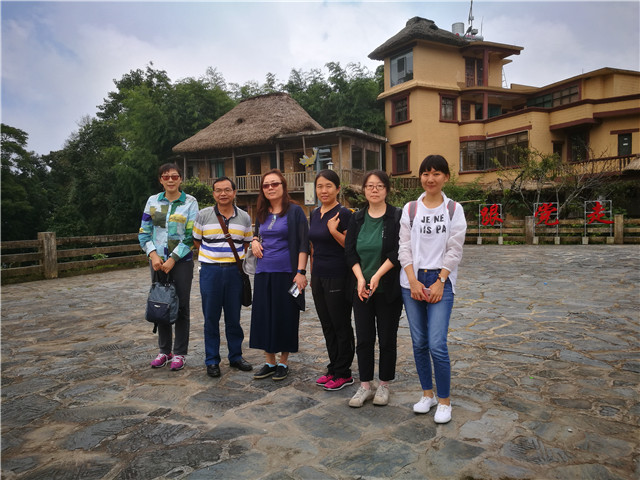An Investigating Summary about “International Comparison on Area of Minority Ethnic: Cultural Inheritance and Innovation”
As researchers on the Middle East and Africa studies, on the one hand, we need to have a cosmopolitan horizon, combining the regional issue studies with the international issues studies; on the other hand, we must base on China’s national conditions, combining the regional issue studies with the domestic issues studies. Based on this, An Chuiying, Feng Jihua and Fan Xiaohong from “the West Asia and Africa” periodical innovative project group as well as Zhao Jia and Zhao Pingyu from ” The Belt and Road Initiative” and promoting China-Africa cultural exchange innovative project group, went to Honghe Hani and Yi Autonomous Prefecture in Yunnan province to conduct a special investigation on “international comparison on minority ethnic area cultural inheritance and innovation”.


Honghe college, as the only public comprehensive university in Honghe prefecture, has prominent professional research features, especially in the field of Southeast Asia national researches and Honghe prefecture minority ethnic group researches. As a result, the investigation group has a symposium with relevant experts from Honghe college. The symposium was hosted by vice president of Honghe college, more than a dozen relevant researchers presented the scene. President Peng introduced the basic situations, subject setting, specialized subjects, international cooperation and etc. about Honghe college. The predecessor of Honghe college is Mengzi normal college which was established in 1978. After forty years of unremitting endeavor by combining local socioeconomic and regional characteristics, the college currently has fourteen faculties, sixty-four majors and the regional studies has considerable research strength. It has “Vietnam research center” which has recorded by the ministry of education, and hosts two Yunnan province philosophy and social science study bases and three Yunnan province high education key laboratories. Professor Yang Jin, who is international Hani research center director and chief ethnology expert, introduced the historic development of Hani nationality, the current distribution of cross border ethnic groups as well as the latest research movements of this center’s research group in detail. Researcher Zheng Hongzhen, the chief of Hani terraced fields protection and research center, systematically interpreted the developing and evolutionary history of Hani terraced field culture, the process to apply for the UNESCO world heritage site and the current collaborative researches as well as scientific popularization to propagate and inherit Hani terraced field culture. Professor Ma Hongbo, who is the political science and international relations faculty dean as well as the chief of Vietnam studies center, chiefly introduced the center’s issue researches, financial support and etc. Professor Luo Youliang, vice president of Honghe prefecture Miao society put forward his own reflections towards the overseas immigrants and their social integration issues. Professor Hao Jianping, vice professor Li Guimei and lecturer Wang Fei from political science and international relations faculty, incorporated their own research perspective to talked about the method of international issues studies, religious dialogue and conflict issues and Burma Karen separation movement separately. Except listening and studying the discourse of experts who attend the symposium, the investigation group members also have some discussion with those experts concerning about the spirit of Hani terraced field culture, social adaption and influence of cross border nationality and dissemination of Christianity, etc.

Honghe is a frontier ethnic minorities autonomous prefecture where many minority groups live together. It has diversified culture research samples of various ethnic groups. Among these, Hani terraced field culture is enlisted as the UNESCO world heritage sites, which is also a landscape painting that Hani ancestors had been carved for over 1,300 years. It directly presents a long history that Hani ancestors struggled tenaciously and reproduced under the social and natural pressure. Under the leading and guidance of professor Huang Shaowen, the vice president of Honghe Hani society, the investigation group members walked along the sinuous mountain trail and observed the majestic Yuan Yang terraced field from different angles. Professor Huang gave a detailed explanation towards the history of migrating and developing of Hani ethnic group, the formation and development of terraced field culture, the methods of cultivation, the supply of irrigation water and the features of seed, etc. on spot. Besides, the investigating group went to the Hani town to experience and observe architecture features, living conditions and national customs of Hani nationality.
Shadian Huizu township is a renowned Huizu township in the southern Yunnan, it affiliated to Shadian town Gejiu city Honghe prefecture. The investigating group was driving through the orderly and tranquil streets and arrived at the biggest mosque in China: Shadian mosque. It started to construct at Qing dynasty in 1684, destroyed in the warfare during the Cultural Revolution, and reconstructed in 2010 and put into use. The investigating group members saw the overall modeling of mosque’s is very elegant and grandiose, and just can feel the openness and tolerance endowed by the religious piety and national spirits.